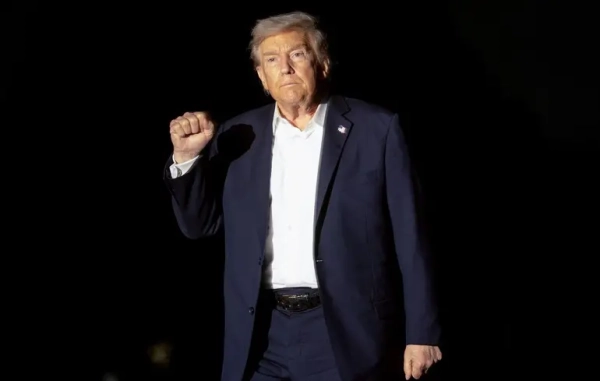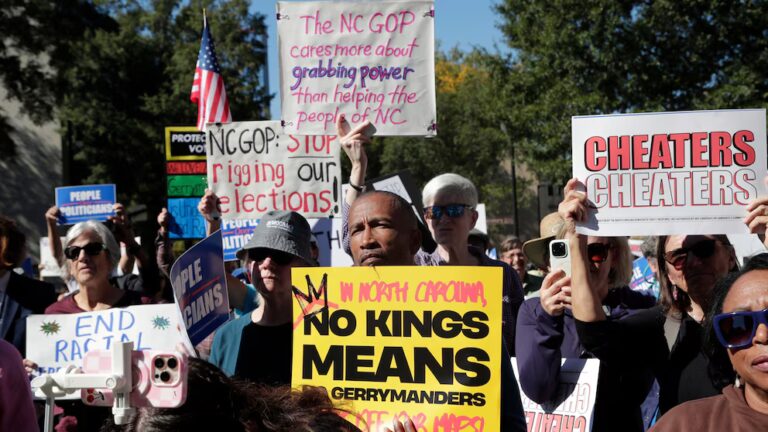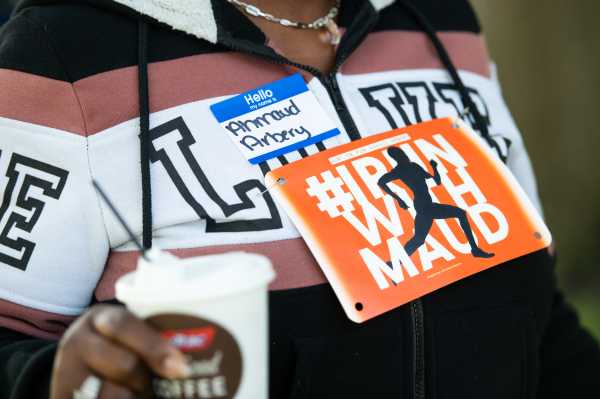
The video is as stark as you can imagine.
A 25-year-old black man, Ahmaud Arbery, jogs down a leafy street in Satilla Shores, a neighborhood in Georgia. He’s moving toward a white pickup truck parked in the middle of the street; two armed white men, former police detective Gregory McMichael and his son Travis, are near it. Reportedly, they had been following him.
Arbery tries to runs past the truck; the McMichaels yell. A shot rings out.
Arbery struggles with one of the McMichaels, seemingly trying to escape. More shots. Arbery takes a few jagged steps — the last of his too-short life — and then collapses to the pavement.
This footage, filmed in late February, somehow was not enough for several Georgia prosecutors to indict the McMichaels — who claimed they were attempting a legally authorized citizens’ arrest of a burglar. It was only after the footage hit the internet in the past week, stunning the nation and kicking off protests in Georgia, that the local authorities got it together to arrest the McMichaels on Thursday.
Ahmaud Arbery’s death is the worst fear of many black men, who experience a level of baseline fear and persecution during routine activities like jogging in majority-white neighborhoods that few others in America can understand. Hoping to understand more, I called Rashawn Ray, a sociologist at the University of Maryland and the Brookings Institution who studies the experience of African Americans in public spaces.
In 2017, Ray published a paper (titled “Black people don’t exercise in my neighborhood”) documenting a striking pattern in which middle-class black men exercise at much lower rates in majority-white neighborhoods than they do in majority-black or racially mixed ones. According to Ray, this reflects routine and commonplace experiences of harassment and mistreatment in white spaces — which they believe could lead to any one of them ending up like Ahmaud Arbery.
“Black men who I’ve spoken to, who have seen the horrific killing of Ahmaud, state that, wow, I’ve had similar sort of experiences where people have followed me: where cars have ran me off the road. Where dogs have chased me. Where people have called the police. Where people have crossed streets while I’m running. Where neighbors have shut their doors. Where they’ve given me negative looks,” Ray told me.
“I mean, these are the common experiences.”
Our conversation used this stark finding as a jumping off point to discuss the broader research on the black male experience — what it’s like to live in a society where police and civilians alike treat you as presumptively criminal, how that sense of threat profoundly shapes the way black men exist in a majority-white society, and what kinds of policy changes might enacted to make the world a safer place for men like Ahmaud Arbery. What follows is a transcript of that conversation, edited for length and clarity.
Zack Beauchamp
Your research found that black men exercise for pleasure and leisure at higher rates than other groups — when they’re in majority-black communities and in racially mixed neighborhoods. Yet there’s a massive decline in exercise rate for black men living in majority-white neighborhoods. Tell me why?
Rashawn Ray
The causal phenomenon primarily [relates to] criminalization — being perceived as a criminal. Black men in particular felt more likely to be perceived as threats, and as potential predators. Blackness becomes weaponized; a black man doesn’t necessarily have to have a weapon on him, but instead his physical body becomes perceived as a weapon that could do bodily harm onto others.
This is primarily linked to stereotypes that people have about black men as being more aggressive, having a higher propensity to commit crimes, or being emotionally unstable. You put these together and it leads to black men being threatened by others. And it leads to others, like in the case of Ahmaud, enacting physical violence onto black men when they’re simply doing something like going for a jog.
Zack Beauchamp
The Ahmaud Arbery case seems like the fears that you were describing in your paper literally coming to life. The men that you’ve been researching, and a lot of black men, they worry this could happen to them. That this could be anybody.
Rashawn Ray
Without a doubt. I’ve done a lot of this research quantitatively and qualitatively: in addition to the quantitative work, I have conducted interviews and done focus groups with people across the country, in neighborhoods with varying racial and class compositions, to figure out what factors really determine physical activity.
I found how linked race and place are to one another. The other thing I found was just how common the stories were, particularly from black men, about negative experiences while engaging in physical activity in public space.
Black men who I’ve [recently] spoken to, who have seen the horrific killing of Ahmaud, state that, wow, I’ve had similar sort of experiences where people have followed me — where cars have ran me off the road. Where dogs have chased me. Where people have called the police. Where people have crossed streets while I’m running. Where neighbors have shut their doors. Where they’ve given me negative looks. I mean, these are common experiences.
For a lot of black men, and also black women who live with black men and who have black boys, one of their worst nightmares is what happened to Ahmaud. When black men go for a run, it isn’t just in the back of their minds. Oftentimes, it’s very much in the front of their minds.
Zack Beauchamp
These experiences you’re describing — of harassment, violence, intimidation, and outright murder — how does the specter of those sorts of things, which obviously exist on a spectrum, affect the way that black men engage in and move around the world? I’m asking not only in the context of jogging and outdoor physical exercise, but in terms of just being a person living in a society where you invariably need to go through majority-white neighborhoods.
Rashawn Ray
In sociology, there’s what we call a signaling process, where black men aim to signal to others that they are not threatening. So they engage in certain acts that other people don’t.
The research that I’ve done has been on middle-class blacks and whites, so these were people who were college educated, professional jobs, oftentimes make a lot of money, with multiple degrees, living in very nice neighborhoods. They talk about doing things that [other] people don’t do when they run. Like wearing an alumni T-shirt, carrying their ID with them, running on well-lit, densely populated roads, waving and smiling at neighbors. Going for a run, and then someone else is coming down the sidewalk, stopping, actually running in the street to avoid that person.
This spills over to other public spaces as well — like work, restaurants, coffee shops, and grocery stores. Black men aim to be perceived as less threatening; they do things like think consciously about their attire; when they’re at work they think about the tone and pitch of their voice. They think about how their physical mannerisms, their behavior mannerisms might be perceived.
Unfortunately, it’s not simply about just trying to make other people comfortable with them. It’s also trying to reduce the likelihood of the negative experience that could forever change that black man’s life.
Zack Beauchamp
Like being shot by some men in Georgia who have decided all of a sudden that you’re a criminal.
Rashawn Ray
Exactly. And there are, of course, several examples.
Now Ahmaud is going to be, unfortunately, another name that we hang up as a martyr, similar to Trayvon Martin, Jonathan Ferrell, Tamir Rice, Theresa McBride. I mean, and you put all these incidents together, and it leads to a very high likelihood of this happening to black men.
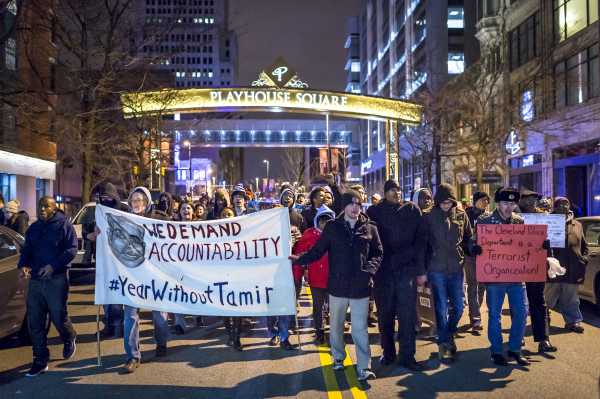
It’s important to note that the older McMichael, the father — his law enforcement background, that’s not just coincidental. A lot of the work that I do is on policing. One of the big things that I know, and I’ve published this work with Dr. Keon Gilbert at St. Louis University, is that blacks are 3.5 times more likely to be killed by the police when they’re not attacking, nor when they have a weapon.
Who says that? Police officers themselves. These are the types of actions that play out, where the very people who should defend you, who should protect you, law enforcement, neighbors, are some of the same people who expose black men to a higher likelihood of death.
Zack Beauchamp
That was something that really struck me about this case, too. It’s not exactly an officer-involved shooting, in the way that we ordinarily conceive of it. But it does seem relevant that one of the assailants used to be on the force.
This speaks to a broader question: To what extent do black men, when thinking about risks, worry about police relative to ordinary citizens? Is there a kind of threat matrix here in the minds of a lot of black men?
Rashawn Ray
That’s a really good question. I think one of the first aspects of the threat matrix — I really like how you put that — I think it deals with the racial composition of neighborhoods.
As an example: When black men are traveling somewhere for work, they oftentimes look up the racial composition of the places where they’re going to. They look up the routes where they might pass through neighborhoods or cities that have a higher percentage of black residents. And then they make decisions on how to make those stops.
I think the second thing is the actual physical setting: whether or not people are isolated and feel actually that they can get away with what they did. If you think about that road [in the Arbery video], and the cellphone footage that was captured, it looks suburban, slightly rural. A place where, if you were going for a run or a bike ride, seems like a great place to go — unless you’re a black man. The McMichaels felt that they had some anonymity.
There’s a feeling that black men get, because of previous encounters they’ve had, where there’s something that literally happens internally. Their heart rates increases, their stress level rises. That lets them know that this situation has the potential to turn negative, and potentially deadly, extremely quickly.
They oftentimes aim to get out of those situations. But they occur in places where they shouldn’t, like running in your neighborhood, stopping at a gas station to get something for your kid. Going to a gas station to get Skittles at halftime of an NBA All-Star game. Stopping to ask for help when your car has run down. Things that normal people do, normal activities, become deadly for black men. Thinking about how isolated the incident has the potential to be [shapes their concerns about this happening].
I think the third thing is trying to get a feeling of how emboldened the person they’re interacting with actually feels. Do they feel like they are above the law? Do they feel like if they can make a citizen’s arrest, do they feel like they are potentially standing their ground?
Because that’s something extremely important for people to realize. Most stand-your-ground laws simply state that people have to fear for their lives. It doesn’t state that you have to be attacked, it doesn’t state that something had to happen to you, that the other person had to have had a weapon. That you simply had to fear for your life. And that fear is oftentimes contingent on the black skin of the person they’re interacting with, and that blackness oftentimes becomes weaponized, and justification for acting out violence on somebody.
Zack Beauchamp
This case has gotten so much attention, because first of all, it’s filmed, and so we can all see the evidence and how shocking it is. I don’t know how common this kind of killing is — maybe you do. But even if it’s not that common, it seems that there’s this spectrum of fear and intimidation that causes people to be afraid, black men specifically, when they’re out in public. And even lower-level harassment leads to the pervasive effects on black male behavior we’ve been talking about.
Rashawn Ray
People who say, oh, well, these incidents don’t occur that often — well, that depends on how you look at it.
Even if we’re not talking about someone being killed, we are talking about someone potentially being beaten up. We’re talking about someone being followed and accosted. We’re talking about a racial slur being yelled at someone. We’re talking about incidents that alter how people move through space, that all of a sudden, black men start saying, well, you know, last time I went on that route, something happened, so I’m going to go on this route.
These negative encounters, these racial discriminatory incidents, also have spillover effects. Where someone had a negative encounter in the neighborhood, they’re less likely to engage in the community. Less likely to frequent public places. Less likely to frequent restaurants.
If you’ve been to a restaurant chain and some food that you ate made you sick, you’re probably not going to go back, even if that same restaurant is in another part of the country. You’re going to say, “Oh, last time I went to that restaurant, I got sick. I actually don’t like eating there.”
That is literally what happens to black people. And the impact that it has on their mental and emotional and physical health also matters.
Zack Beauchamp
There’s a line in your paper on black male exercise patterns that really stuck with me. You write that: “Unfortunately, research shows that black men’s social class cues are unable to substitute for the intersection of their black skin and maleness.”
Tell me about how that’s been established in the literature. How do we know that, say, a black Harvard grad putting on a Harvard sweater doesn’t do much to decrease the threat to him?
Rashawn Ray
I think there are two main comparisons.
First: Are black men who, say, wear Harvard sweaters treated better than a black man who doesn’t? Potentially. But the main comparison that should be made isn’t necessarily one black man to the next black man. It should be a black man to other men, to white men. I think that is the comparison, oftentimes, that we don’t actually make.
I think there are a couple more studies to note here. First, there was some research that looked at what is the likelihood of getting called back for a job based on the place you got your degree from. It had two categories of blacks, two categories of whites: one group in each race came from Ivy League schools, and the other group came from state schools.
The research found that not only were whites who attended Ivy League schools way more likely to be called back and hired, but whites who attended state universities had a similar likelihood of being called back for jobs as blacks who went to Ivy League schools.
Research also shows what happens when blacks are perceived as being militant. Blacks who have been involved in certain civil rights organizations or other organizations that are perceived to be about racial justice and social change have been less likely to be admitted to college relative to those that didn’t do that.
Zack Beauchamp
So on the one hand, there’s an expectation that black men need to alter their behavior to fit norms that make them nonthreatening to whites. And then on the other hand, meeting that expectation still isn’t enough: No matter how hard they try to fit whatever normative expectations of a nonthreatening, safe person are, they’re still at significantly higher risk of these kinds of hostile social encounters.
It’s like a rigged game.
Rashawn Ray
Yes, without a doubt. That’s part of the psychological, social psychological process, that black men go through to essentially aim to juggle and balance these potentially deadly interactions.
One of the best examples that I can provide is there is a city councilman in Tennessee. In a previous job, he had to travel around a lot, he was doing nonprofit work — raising money for cancer research, of all things. He had on a suit and a tie, and he got pulled over, he had a rental car; one of the headlights or one of the taillights was out.
The police officer’s talking to him, and starts scolding him about the lights, and he said, well, you know, this is a rental car. He said I’m here doing work. And he starts telling him what he was doing there.
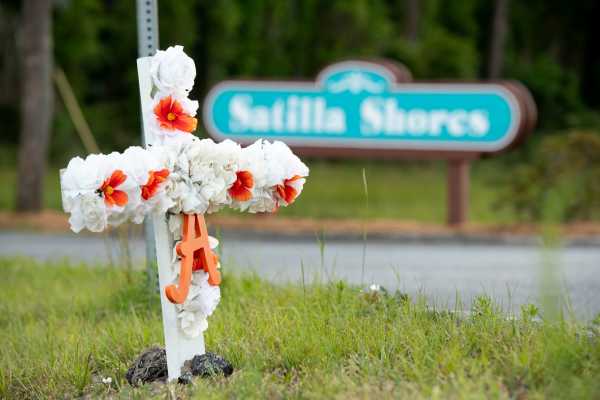
That conversation then pivoted, and he said telling him where he graduated from, and the job he was doing, and why he was dressed that way, he thought that would help him. But it actually made the encounter worse.
I have spoken to many black men who say it is a balancing act to appear as if you are not a criminal, but you also don’t want to appear as if you’re too smart, or that you’re too successful, because then that also has implications, depending on who you’re interacting with.
Even though the percentage of police officers who have a college degree is increasing, most police officers don’t. Trying to talk proper, trying to speak as if you were more educated, if you will, can also have negative consequences — depending on where you’re at and who you’re interacting with.
Zack Beauchamp
Last thing. You talked a little bit earlier about policy change, but it seems like there aren’t obvious policy fixes to a lot of the problems that you document. What do you do about the fact that in majority-white neighborhoods, a lot of white people feel entitled to call the police on a black man that they see running?
How do you change the underlying social norms and expectations? Does there have to be some sort of massive societal transformation? It’s easy to come away from talking to you and reading your research and to feel pretty down on the prospects for dismantling this particular element of racial hierarchy.
Rashawn Ray
It can definitely be depressing. But there are a few things, though, that I think are important.
On the policy side, I do think that stand-your-ground laws and citizen’s arrest laws need to be reevaluated and probably removed. And part of it is because research continuously shows the inequitable distribution of how those policies are applied. If you are a white assailant, like the McMichaels, or you are a white victim, you are much more likely, if you’re on the assailant end, to be able to use the citizen’s arrest law [as a defense]. To be able to use the stand-your-ground law.
I think the second thing is when people are calling the police, or whomever they call, on black people moving through space — when nothing is found out, the “crime” is simply walking or jogging while black, there needs to be a fine associated with that. Those fines will start to set a precedent that this type of behavior will not be tolerated.
The third thing: Racism, particularly white racism enacted on black bodies, is really a white people issue. What we need are for white people to speak up and speak out when they see these incidents that aren’t right.
In black communities, people talk about the stop snitching campaign, the fact that black people don’t talk to police. They don’t talk to police because they don’t trust them.
But you know, in predominantly white neighborhoods, white neighbors don’t tell on their neighbors either when these kind of things happen. That’s something that we need to call out, we just don’t frame it that way.
My grandfather would always tell me my silence is my acceptance. And what I oftentimes see, similar to predominantly male settings, is that it also happens in predominantly white settings. That there are white people who hear something racist, see something racist, they don’t agree with it, but they don’t say anything either. And that is where we really get into the difference between being an ally, and being an advocate.
An ally is someone who can wear some kind of white ribbon, or some kind of ribbon saying, yeah, support this cause, I support racial equality. But when it hits the fan, you don’t speak up for people who are being discriminated against. An advocate, on the other hand, speaks up for people when the people from that group are not around.
There are conversations that happen at tables all across America, tables that are oftentimes predominantly white, where race comes up, and there are people at those tables who don’t agree with what was said, but just don’t feel like getting into it. If we’re going to move past race, we need those people to get into the fight.
Because black people don’t have the luxury of not being involved.
Support Vox’s explanatory journalism
Every day at Vox, we aim to answer your most important questions and provide you, and our audience around the world, with information that has the power to save lives. Our mission has never been more vital than it is in this moment: to empower you through understanding. Vox’s work is reaching more people than ever, but our distinctive brand of explanatory journalism takes resources — particularly during a pandemic and an economic downturn. Your financial contribution will not constitute a donation, but it will enable our staff to continue to offer free articles, videos, and podcasts at the quality and volume that this moment requires. Please consider making a contribution to Vox today.
Sourse: vox.com

